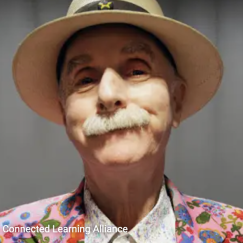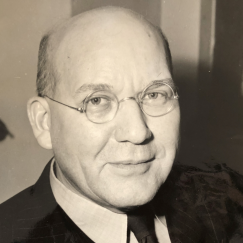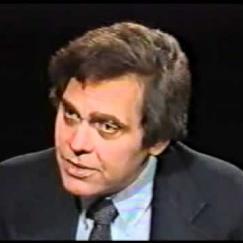The opportunistic teacher who embraces the leisure interests of his pupils in the hope of leading them to higher things is as frequently unsympathetic to the really valuable qualities of popular culture as his colleague who remains resolutely hostile. A true training in discrimination is concerned with pleasure.
Bio/Short Description
Neil Postman inspired a generation of media literacy teachers through his imaginative and accessible writing, which conveyed the message that it was important to learn to critically analyze the dominant technologies which surround us. Postman started his career as an elementary educator and was himself influenced by the work of Marshall McLuhan. He became a guiding light in the field of general semantics and served as editor of ETC for many years. Media literacy educators valued his books about schooling, including Teaching as a Subversive Activity (1969) and Teaching as a Conserving Activity (1979). He is best known for his seventeen books, including Amusing Ourselves to Death (1985), Conscientious Objections (1988), Technopoly: The Surrender of Culture to Technology (1992), The Disappearance of Childhood (1994) and The End of Education: Redefining the Value of School (1995).
In the 1970s, Postman extended McLuhan’s theory that media and technology profoundly influence human society. Postman introduced the term media ecology as the study of media environments (1970, 161). Invoking a biological metaphor, he later explained, “A medium is a technology within which a culture grows; that is to say, it gives form to a culture’s politics, social organization, and habitual ways of thinking” (2000, 1). To say that Postman problematized technology is an understatement. He was deeply influenced by Harold Innis (among other harbingers, mostly male), who warned in The Bias of Communication (1951) that Western civilization faced a great crisis associated with mass communication, including an obsession with the present that disregarded the past and future.
Among Postman’s many trademark questions were “What is the problem to which this technology is the solution?” “Whose problem is it actually?” “If there is a legitimate problem, then what other problems will be created as a result of using this technology?” “Am I using this technology? Or is this technology using me?” (1999, 42). For Postman, technology presented not only a social, economic, and political problem but a moral one as well.
HOW THEY INFLUENCED YOU?
External Links
Videos
Other Grandparents
 ColinPosted By: Renee HobbsOn:07/13/2025 - 00:50
ColinPosted By: Renee HobbsOn:07/13/2025 - 00:50
 BillPosted By: Renee HobbsOn:06/29/2025 - 20:45
BillPosted By: Renee HobbsOn:06/29/2025 - 20:45
 HowardPosted By: Renee HobbsOn:01/27/2024 - 22:47
HowardPosted By: Renee HobbsOn:01/27/2024 - 22:47
 Gary Posted By: Renee HobbsOn:01/01/2024 - 00:39
Gary Posted By: Renee HobbsOn:01/01/2024 - 00:39
 Clyde Posted By: Renee HobbsOn:04/04/2023 - 18:16
Clyde Posted By: Renee HobbsOn:04/04/2023 - 18:16




Renee Hobbs
"While a critic of what was considered standard educational and pedagogical methods, Neil had a deep and profound understanding for and devotion to improving learning. "
--quote from Terrence Ripmaster, professor emeritus, William Patterson University
Renee Hobbs
Of course, I was inspired by Neil Postman as were many young scholars of my generation. I remember reading Amusing Ourselves to Death (1985) and using it to teach my undergraduate course in Media and Society at Babson College as a new assistant professor. Postman's brilliant, accessible writing was an inspiration to me and I could see his good teaching instincts behind the shape and structure of his books.
When I got the chance to meet him in Cambridge for the first time, in 1993, I invited him to participate in the Harvard Institute in Media Education, which I had organized -- it was the first national-level summer teacher education program in the U.S. for media literacy educators. He was incredibly kind to me and very supportive of the project. Having him participate in the program helped draw more than 100 teacher leaders to the program and I was pleased to be able to interview Neil when creating my first documentary about media literacy, Tuning in to Media (1993). I understood, even then, that he was not a "computer guy," and that reaching him by telephone and letter was better than email. Neil's work resonated with me because of my own love-hate relationship with media culture and my appreciation for his deep humanistic values centered around the power of language to shape human experience. In 2014, I got the chance to reflect on Postman's impact on my thinking about media and learning in a 10-minute talk recorded on video.
Vanessa_Domine
I was fortunate to have Neil Postman as my advisor when enrolled in the PhD program at New York University. As one of his doctoral students, I engaged in many conversations with him about the possibilities and perils of technology. While he and I disagreed on a multitude of topics, I came to discover that underneath Postman’s sardonic social criticism was a cautious optimist who perceived his role as hoping for the best by pointing out the worst. While Postman is most known for his critique of popular media (particularly television), his work is foundational to the growth of digital and media literacy as both a field of study and a movement. An educator-turned-communication scholar, Neil underscored the grammatical side of media, and he magnified for English language-arts teachers everywhere
On the spectrum of technological determinism and social determinism, Postman and I were polar opposites. I was born in 1969 in California and raised in Silicon Valley, the technological capital of the world. In the 1970s, my father worked for IBM as an electrophysicist and assisted in the development of the first VCRs and personal computers. I experienced firsthand the emergence of the information age. Among my favorite childhood memories of my father were the custom-built radios and other electronic devices that he would bequeath as birthday gifts. My family was one of the first in our sprawling suburban neighborhood to own a personal computer, and I distinctly remember the joy when we replaced our TRS-80 computer (that operated via cassette tapes) with a new Apple IIe computer. My childhood experiences with media and technology were seemingly utopian, as they coincided with growth and progress in my family. I grew up watching Sesame Street, yet I was also highly print literate and loved to read books. I watched MTV and played hours of Atari video games, yet I was highly social with many friends. I spent at least four hours a day, if not more, using television and computers, yet I also loved to learn in school and I earned good grades. But when my father died suddenly when I was just twelve years old, it emotionally and financially devastated my family. From that point forward, using media and technology became symbolic of many things for me. Not only did it eventually become a means of earning a living (survival), but it was also a symbolic way for me to honor my father.
It wasn’t until I was an undergraduate communications major in college and read Postman’s The Disappearance of Childhood (1982) that I seriously reflected on my media-saturated childhood and its possible impact on my social, emotional, and intellectual development. Postman’s argument about the obsolescence of childhood through the introduction of broadcast media did not resonate with my lived experience. I did not readily perceive any disadvantages until I read the widely popular Amusing Ourselves to Death (1984) that essentially rebuked television entertainment for overextending into the realm of serious and sacred spaces in our personal lives. Postman drew on the work of Walter Ong (1958) who theorized the loss of reason and logic as a result of the transition away from orality and print into the visual culture characteristic of the modern electronic age. The dissonance between Postman’s ideas and the reality of my own childhood propelled me further into deeper (graduate-level) study of media, technology, and human communication.